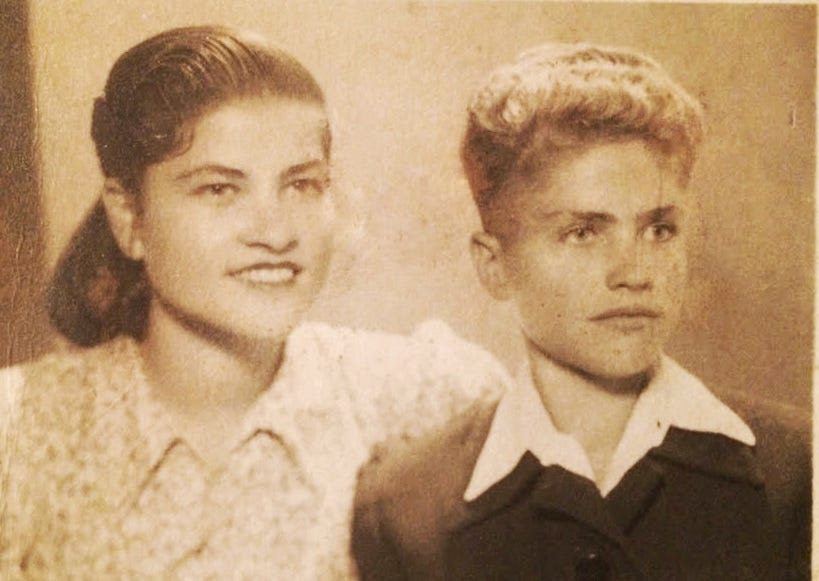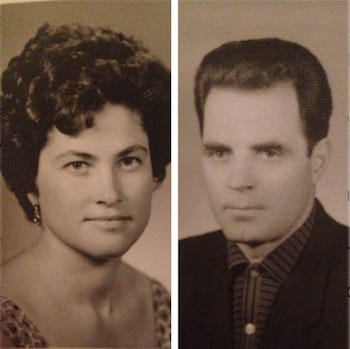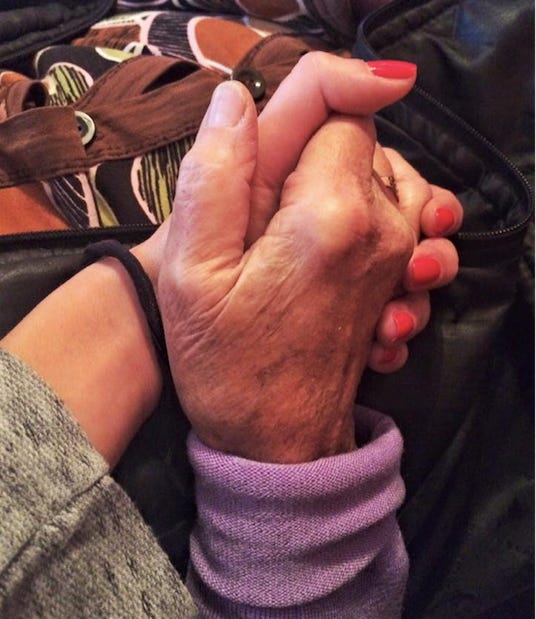The Profile: The billionaire drug dealers & the femme fatale of short-selling
Good morning, friends.
Since this newsletter is about people and the lessons we can extract from their life experiences, I came across something that is a perfect fit. In 2013, I interviewed my great-grandmother about her childhood, living through World War II, what she learned from 53 years of marriage, and more. Obviously, I’ve never shared this conversation before, but I think there are some life lessons in here that have withstood the test of time. I hope you enjoy.
--
A little background on my great-grandmother: Her name is Nikolina, and she was born on April 2, 1935 in a small town in Bulgaria near the Greek border. She was one of 11 and only made it to the 7th grade before starting work to help support the family.
(Pictured below: My great-grandmother & her younger brother)

You were a kid when World War II broke out. What do you remember from that time? (Bulgaria declared neutrality when the war began, but later entered a passive alliance with the Axis. German troops used Bulgaria as a base.)
My family and others in the neighborhood took in German soldiers, giving them food & shelter as they passed through. During blackout periods, we were told to turn off all the lights and cover the windows with blankets so it would look like the town wasn’t populated. I remember complete darkness. There wasn’t a lot of food at that time — and we were 11 kids — so you just didn’t know whether you would survive.
The Germans destroyed us. Everything was in ruins after the war, and then the Bulgarian Communist Party came into power. For 15 years during the Socialist period, I would work from dark until dark. Young and old — everyone worked on the fields all day. Slowly, people started re-building their lives.
How did you meet my great-grandfather?
I met him in 1952. My sister’s husband worked with him, and they were walking together when he saw me for the first time. My brother-in-law said, “Look at how beautiful she is. Why would you even think to look at other women?” So he started hanging out around me more and more, and I couldn’t get rid of him. I was 17 years old then, and a few months later, we were married. My parents were furious because I was too young. At that time, no one married for love — but I did.

How was 53 years of marriage?
We were together for 53 years, until he passed away. I have never been with anyone else, and he’s all I knew. I can’t say our marriage was perfect, but it was a good life together.
To understand what someone will be like as a partner, you need to look at their upbringing. Your great-grandfather was the oldest sibling, and his mom allowed him to become the head of the household early on because his father was an alcoholic. Growing up, he would protect his five younger sisters when his dad lost his temper. As a result, he was always extremely protective of me as well. And that would sometimes turn into jealousy — he thought that because I was so young when I married him that I would be curious about other people.
Were you?
When you commit to someone, you can’t be curious. That shouldn’t even go through your mind. It’s an excuse that people use to escape the problems in their relationship. They think that if they quit and find someone else, the problems will go away. They won’t — there will be other, new problems. No two people are perfect, but over the years, they can help each other learn to break their bad habits.
What is the most important lesson you’ve learned in life?
There has to be compromise in the family. You need to know that there will always be disagreements, but you have to make the decision to stay together. The compromise isn’t just for the woman in the marriage; it has to apply to the man, too. When you’re young and beautiful like we were, falling in love is easy. But you have to fall in love with someone’s soul — because you will get old, but the soul will never change.

Needless to say, this is only a fraction of our conversation. Our families carry so many amazing untold stories. Unfortunately, very few of us take the time to ask them questions about their lives, their experiences, their secrets. Pick up the phone and just listen.
—
In other news, this week’s profiles are all must-reads.
— The femme fatale of short selling [**HIGHLY RECOMMEND**]
— The underrated NBA champion
— The teachers trained to kill
— Hollywood’s moral compass
— The firm that hires brokers with a checkered past
— The school of the future
— The billionaire drug dealers
PEOPLE TO KNOW.
The femme fatale of short selling: Fahmi Quadir was one of a small group of short sellers who bet, correctly, that Valeant’s price gouging, questionable tactics, and massive debt burden could not be sustained. At the age of 27, Quadir launched her own hedge fund in 2017. Although she was up 24% last year, it came at a very, very high price.
“When you're so young and you have a big short under your belt, people are going to be skeptical. We're not all macho, testosterone-driven guys that are looking to see the world burn.”
The underrated NBA champion: Early in his career, Steph Curry was anything but impressive in the eyes of those around him. “Undersized.” “Not a finisher.” “Extremely limited.” He remembers it all. When he was 13 years old, his parents sat him down and gave him the following advice: No one gets to write your story but you. “Anytime I’ve been snubbed, or underrated, or even flat-out disrespected,” he says, “I’ve just remembered those words, and I’ve persevered.” Because of those experiences, Curry is now launching The Underrated Tour, a basketball camp for any unsigned high school players rated three stars and below.
“The way that ‘underrated’ might start off as just some feeling the world imposes on you. But if you figure out how to harness it? It can become a feeling that you impose on the world.”
The teachers trained to kill: The question is no longer, "Should we arm teachers?" Now, it's, "How many armed teachers are already out there?" A GQ reporter went to Ohio to embed with the men and women behind FASTER Saves Lives, a group that has trained thousands of teachers from all across the country how to shoot to kill. This is a very sobering article.
“This is a combat environment. Just like in war, there might be noncombatants who get killed. Even by the good guys.”
Hollywood’s moral compass: For many years, Reese Witherspoon was America’s sweetheart. But she has quietly transformed from the perky-blonde actress into a big-time producer and champion of the overlooked & underestimated. She’s founded a female-led production company & has become a staunch activist fighting for greater representation of women in Hollywood. “Sharing our stories,” she says, “is the antidote to the disconnection that divides us.”
“Reese was never anyone’s sweetheart. We just thought she was.”
COMPANIES TO WATCH.
The firm that hires brokers with a checkered past: International Assets Advisory is just like any other wealth management firm except for its very unusual approach to recruiting. It gives the “unemployable” a second chance by hiring brokers who've had past run-ins with the law. Offenses vary from minor infractions, such as shoplifting as a teenager, to enforcement actions from groups like the Financial Industry Regulatory Authority. But it can get complicated — how do you decide who deserves a second chance?
"I believe in second chances and that there are two sides to every story.”
The school of the future: America’s student loan debt problem is nearing a full-blown crisis. Now, an online learning startup is experimenting with an intriguing new education model. Rather than charging students tuition, students attend Lambda School for free and are required to pay back a percentage of their income after graduation — but only if they get a job with a good salary. Could this be the future of higher education?
“There are no schools that are incentivized to make their students successful anywhere.”
FROM THE VAULT.
The billionaire drug dealers: The secretive family behind OxyContin has stayed out of the spotlight. While countless patients have become addicted to the pain medication, the Sacklers have made billions of dollars in profits. In order to benefit from the addiction-fueled cash machine, the family members must first swear by a single oath: Never comment publicly on the source of the family’s wealth.
“The Sacklers have hidden their connection to their product. They don’t call it ‘Sackler Pharma.’ They don’t call their pills ‘Sackler pills.’ And when they’re questioned, they say, ‘Well, it’s a privately held firm, we’re a family, we like to keep our privacy, you understand.’ ”

